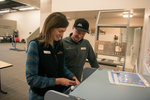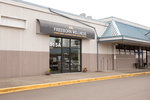

A new physical therapy clinic, Freeborn Wellness, has recentlyopened its doors this year in Centralia. With a gym to simulate work-related tasks to help injured workers return to their jobs, it’s the first of its kind in Lewis County.
“People were really marginalized down here because they didn’t have a facility that could cater to them, to their needs,” said Andrea Freeborn, one of the owners and the occupational therapist. “So they oftentimes wouldn’t get the therapy that they needed … then they’re more likely to get re-injured because they’re not truly able to do (the job) yet. They’re not 100 percent ready.”
Most of Freeborn Wellness’ clients are injured workers. Inside the clinic is an occupational industrial gym, with equipment that owners Andrea and Cory Freeborn built to simulate work activities. Previously, people in Lewis County had to head north for that type of rehabilitation.
For the Freeborns, helping people return to work is personal. Cory Freeborn is a firefighter, and was injured on the job about 10 years ago. For a while, he didn’t know if he would be able to return to his job.
“I was injured on the job as a medic,” Cory Freeborn said. “I had a significant injury where I was out of work for almost a year. I actually went through this program — work conditioning, work hardening.”
Both remembered the exact day Cory Freeborn was injured — April 19, 2009. It made their family understand how a work injury affects everyday life.
“Even unloading the dishwasher, you know,” Andrea Freeborn said. “I remember the day that he couldn’t bend down to get the bottom rack, so we would share. I would get the bottom rack, he would get the top rack.”
A drunk driver hit Cory Free born while was in the medic unit. The first doctor he spoke with didn’t believe he would return to work.
“It totaled the rig and basically injured my back,” he said. “It was tough because my career path was to go to the fire department full time and I had to face the challenge of maybe that’s not what I am going to be doing now.”
Ten years after the injury, however, he is not only back on the job but running Freeborn Wellness with Andrea.
“We train our staff, you know your job better than anybody, right?” he said. “For me, there were job tasks that I did and people couldn’t understand, like pulling a patient that weighs several hundred pounds out of a bathtub. How do you mimic that in physical and occupational therapy? I was the expert in trying to display how we would do that. It’s the same with everybody that comes in here. We just want to pick their brain and make sure they understand that we want to do everything that we can.”
The most common injuries, Andrea Freeborn said, are for knees, backs, necks and shoulders. Freeborn wellness specializes in industrial therapy, so if someone is injured and wants to go back to work, they go through physical therapy and occupational therapy. In addition, the person can do work conditioning and work hardening, where they simulate people’s jobs before they return.
“It can be a real challenge for people, because oftentimes someone is off of work for a couple of years,” Andrea Freeborn said. “There is a lot of changes and a lot of uncertainty when you have been injured and maybe gone through surgery. So they get that opportunity which is really great.”
How long someone works with the clinic varies.
“Depending on their injury, and their return to work goals, it may be 12 weeks of PT (physical therapy), and then they go into work conditioning for four weeks,” Andrea Freeborn said. “But then with work conditioning, they are actually here five days a week for those four weeks and it’s two hours a day. So it’s like having a job.”
People may also go through work hardening, which is an intensive program that begins at four hours per day and increases up to eight hours per day. Clients work with the physical therapist for two hours and the occupational therapist the rest of the time.
Andrea Freeborn said there is a large psychosocial component to the rehabilitation because, when people have been off work for a long time, the therapy gets them back into a routine.
“We are here specifically to treat the person as a whole, not just what their injury is,” Cory Freeborn said. “There are all kinds of things that might be going on in their life. I mean, their marriage might be on the line, they might be financially having a hard time because they’re not making their full paycheck. … It’s more than what people realize.”